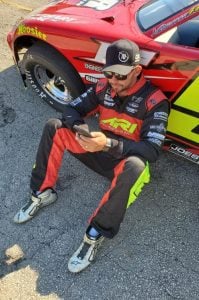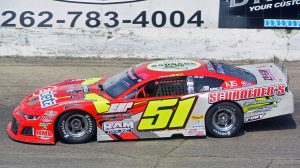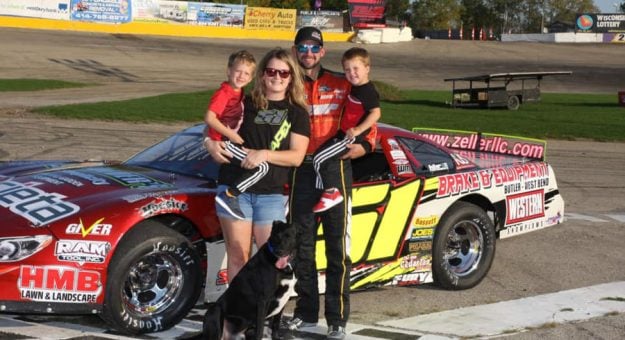Race car drivers are often the fiercest competitors one could encounter. But there is also a soft spot in their hearts when it comes to bettering the community or helping a fellow driver in a time of need, no matter if the drivers have disagreed or thrown punches at each other previously.
Racing is about community. Racing is about family.
Over the last 10-plus months, Slinger, Wis., native Steve Apel and his wife, Liz, have found that out in an unbelievable way.
About a year ago, their oldest son, Cameron, became ill. His health eventually improved and life moved on. Then, Cameron got sick again and got better. This repeated itself at least three more times during a two-month period.
“We decided that it was best to take him to Children’s (Hospital in Milwaukee) and get some answers, figure out what’s going on,” Steve Apel said.
Several tests and chest X-rays were done on Cameron, who is now 7, and the initial news wasn’t favorable.
“Whatever it was, they didn’t know what it was,” Apel said. “But it wasn’t good.”
Steve and his wife feared the worst of everything, including leukemia.
“It was a lot to take on,” Apel said, adding the doctors eventually ruled out leukemia.

Cameron Apel was eventually diagnosed with aplastic anemia. According to the Mayo Clinic, it is a condition that occurs when the body stops producing enough new blood cells. The condition leaves the person fatigued and more prone to infections and uncontrolled bleeding.
A rare and serious condition, aplastic anemia can develop at any age. Steve Apel said it was something Cameron acquired. He was not born with it.
“It’s been a roller-coaster of emotions,” said Apel, a five-time super late model track champion at Wisconsin’s Slinger Super Speedway. “You’re just trying to get through each day, day by day, and figure out what’s next.”
What was next was Cameron was going to need a bone-marrow transplant. Harrison, his younger brother, was a perfect match.
“If it wasn’t Harrison for being a match, then we’d have to go through a registry, which you don’t know what that means,” Apel said. “It could be months; it could be years (to find a match).”
“We were so thankful Harrison was a match,” Liz Apel said.
As this was unfolding, the Apels made what they said was an easy decision and shared their story on social media. They didn’t think about keeping the events to within family and close friends. Cameron had his transplant on April 11 and he’s been on the upward swing since, even returning to the track and watching dad win a race not long after.
In recognition of his bravery and courage, Harrison received an award. Modern Woodmen of America presented him with the Hometown Hero award Sept. 18 at Slinger. When news of Cameron’s challenge landed in front of the community, it raced to support the Apels. The effort was led by Steve’s competitors, some of whom he’s had disagreements with on the track.
“We wanted people to know what we were going through,” Steve Apel said. He added that he and his wife also wanted to take the opportunity to raise awareness about the importance of being a bone-marrow donor as a reason to share their story on social media.
The response was overwhelmingly positive.
Slinger Super Speedway, the Apels’ home track, held an event encouraging fans to sign up to be a bone-marrow donor. About 40 people signed up to be donors.
The support didn’t end there. Cameron spent several months in the hospital getting ready for the transplant and the recovery. During that time, a seemingly endless line of gifts, well-wishes and more poured into the Apel home and Cameron’s hospital room.
“It made things a little bit easier; knowing they were looking out for you,” Steve Apel said.
Support was also shown on the race track as drivers from around the country put Cameron’s name on their cars. Among them was NASCAR Truck Series driver and Wisconsin native Derek Kraus. Their story even aired during a NASCAR pre-race show.
NASCAR Sprint Cup Series champion Chase Elliott did a video call with Cameron in his hospital bed.
“Looking at Cameron, (Steve) knew it was going to make him excited,” Liz Apel said. “Getting something from Florida or Texas or wherever, and Steve’s got so much knowledge about all the different series around the country, he’d share with him who this person is, what they race. It helped pass the time.”
When NASCAR visited Road America during Fourth of July weekend, a video went viral of a little boy pushing Elliott’s car through the paddock. That boy was Cameron Apel.
“(Elliott’s crew chief) Alan Gustafson walked over and said, ‘Hey. Do you guys want to help us push the car back to the trailer?’” Steve Apel said. “Cameron was like, ‘Heck yeah man!’”
While it was a great surprise for the Apels to see the support, those who know the racing community were less surprised.

Often around the U.S., it’s race car drivers who are leading the way to better his or her community.
Looking solely at the Slinger Speedway community, Tom Berens is a go-kart mentor, Todd Buckley donates his winnings to various fundraisers including Stars & Stripes Honor Flight, and Andrew Meyerhofer raises money for the Ronald McDonald House.
“For the most part, racing is a way of life,” Steve Apel said. “We all do it. None of us do it for a job. We do it for fun. It’s a hobby. And when somebody is in need, we help out. That’s the way racers are. The racing community is so big across the country. We all do the same thing. We all have day jobs, work on our stuff at night and go race on the weekends. When it comes to helping somebody out or they are struggling, a lot of people have been there.”
Liz Apel said, “You see them at every track, whether it’s here, across the state or whatever, you’re just kind of family (and feel) the need to give back to them; somebody that you see every day, every weekend is struggling.”
Wisconsin driver Andy Monday led an effort to raise more than $60,000 for a teen boy undergoing treatment for lymphoma.
Fifteen-year-old Jacob Perry of Pawcatuck, Conn., put more than 100 names of cancer victims and survivors on his car to honor them. He was inspired to do this after two of his grandparents died of cancer.
A collection of drivers in Michigan drove with decals on their cars to raise awareness about cold-case murders. And it’s not just on the short tracks. Drivers from the higher professional ranks around the world are also out front to help better their communities.
Rob Hodes, an American LMP2 and LMP3 driver, raised awareness about human trafficking while competing in the European Le Mans Series and the Michelin Le Mans Cup.
Clayton Williams is an official ambassador for Donate Life America. DLA is a non-profit organization helping grow awareness for donor registration to help shorten the waiting time for life-saving transplants.
NASCAR driver Armani Williams races with a mission to raise awareness of autism. Williams was diagnosed with autism when he was 2.
Whether it’s organ donation, mental health, hip dysplasia, drug abuse or addiction, hunger or anything else in between, race car drivers from all corners of the world don’t shy away from the opportunity to better their communities, no matter what cost it takes.
“Yeah, we race hard on the race track,” Steve Apel said. “But at the end of the day, most of us get along.”
Even during the height of soaring gas prices this summer that still holds true.
Jared Apel, Steve Apel’s brother, drove from Wisconsin to Iowa to compete in a Legend Car race. The money he earned stayed behind and was donated to support a family devastated by the murder of three of its members at an Iowa state park.
“It was the right thing to do,” Jared Apel said.
That’s as good of a reason as there could be, no matter what happens on the track.
